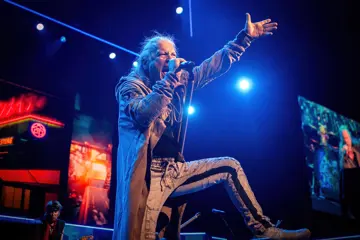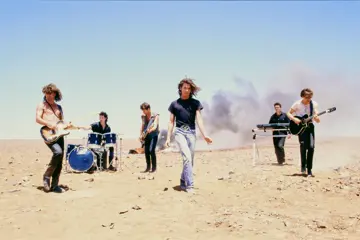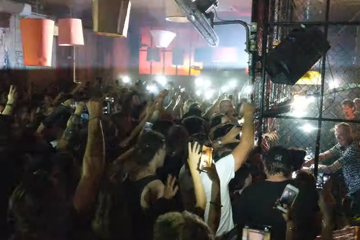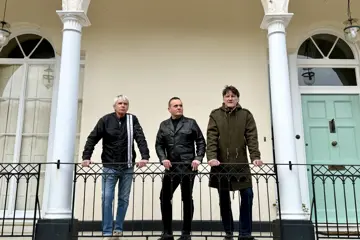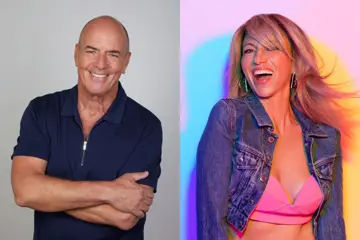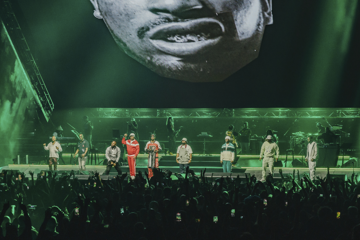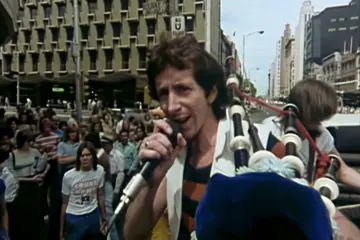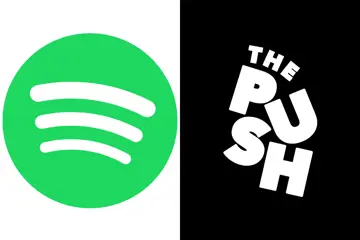Elizabeth Maniscalco — a force to be reckoned with in the world of Australian producers as Elizabeth Rose — is absolutely tiny in stature. "I know, I know" she laughs, "I get that a lot." She actually fits into a suitcase — there's photographic proof on her Facebook.
We're curled up in a tiny patch of sunlight that is providing absolutely zero warmth on The Music's office roof, Rose's publicist snapping away for the producer's various social platforms. They run a few poses for Boomerang and grab me in for a Snapchat, complete with lots of emojis. And peace signs (she's just returned from Japan and is revamping the pose). There's a lot of socialling going on, something that, while an integral part of boosting her career, deeply affects Maniscalco. "I feel [anxiety] from time to time about being so consumed by all these social media platforms that I have to keep up to date with and I have to represent myself through," she explains.
Her debut LP Intra is a journey into the young producer's psyche, exploring the issues she cares most about or feels to the greatest extent. Anxiety covers this particular vulnerability. "The song is about having anxiety because of having an online presence — being public and having social media and being an artist and having to put yourself out there, show so much and give so much of yourself. Like, yes, that is great and therapeutic, but at the same time it's like… urgh!" she exclaims. "That's my personal thoughts and feelings and, like, people judge you on the internet! Like they can be horrible."
"It's pretty daunting working with people who are like, successful. You just feel like 'Oh God, they're gonna judge me and they're gonna see that I'm not as good as them.' "
As "an anxious person", Maniscalco could be seen as both lucky and unlucky to be thrown into the deep end with big name collaborations so early in her career — lucky for her music, unlucky for her nerves. "It's pretty daunting working with people who are like, successful. You just feel like 'Oh God, they're gonna judge me and they're gonna see that I'm not as good as them.' You get all these insecurities coming up.
Don't miss a beat with our FREE daily newsletter
"I almost psyched myself out [when] I did a writing session with Gotye for a week. He wrote with me in his massive barn where he has all these instruments that he collects. I stayed for the whole week and cancelled work, I was like 'CANCEL EVERYTHING,'" she laughs. "That is the only time up until this point where I have been, like, truly intimidated, like, 'I don't wanna put ideas down because I'm so nervous around him.'"
That fear of judgement initially held her back from writing EPs and singles with the kind of political motivations seen on Intra. "I used to really pick apart everything and think 'Does this fit, do I really need to write about that, should I do that, are people gonna hate this?' [When] I started I felt like I had to tread carefully because I was new and I didn't want to start on the wrong foot," she explains. "But now it's like, urgh, it doesn't matter, it's a creative output… I feel more confident to talk about anything I want now." Six years into her career she's brazenly writing about everything from gun laws to same sex marriage. "I think [Malcolm Turnbull] has more of a chance [at legalising gay marriage] than what Tony Abbott did. It's pretty disappointing that we're still waiting for this to happen — it shouldn't be made such a big deal of it being an 'issue'," she says emphatically.
Having recently travelled overseas, Maniscalco has had time to reflect on and compare her home country's politics. "Seeing how other countries are run — whether that be equality or legalising gay marriage, even like, transport systems! Australia is so behind and so disorganised in a way. We just haven't got our shit together." Maniscalco feels that she has gained some perspective on Sydney's status as an international city, and her thoughts on lockout laws are made very clear. "It's very limiting. Again, with being overseas, you come back here and it's just like, 'Urgh, there's no fun in Sydney!' There's no fun at all — can't drink on the street. There's just a lot of negative things about Sydney. It's ridiculous."
Intra's most personal song isn't about gay marriage or gun laws, or even anxiety. It's Steel Hearts — the longest song on the album — which deals with love and loss, something Maniscalco talks about with detachment. "I was in a serious relationship when I wrote that, and it's kinda weird being out of it now and seeing that [the song] was like a time capsule. That's a song that's really close to my heart. I got emotional in the take that I recorded it in because I was feeling like, you know, people feel overwhelmed by love and scared at the same time that you might lose it."
"Australia is so behind and so disorganised in a way. We just haven't got our shit together."
On a lighter note, her views on social media extend to the dating realm of 2016 — "Everything is about being online, like, fucking Tinder. Like, isn't that fucked?" she exclaims. "It's stressful! We all have to be connected via the internet and it's too much! Ten years ago I wouldn't want to socialise as much, but nowadays from talking online, I wanna see people face to face. I wanna go on a real date!"
We steer away from boys and get on to girls — specifically, the challenges she faces as a female producer in a genre and a scene traditionally dominated by men. "Yes, [sexism] does happen; it's happened to me. There are things that make me feel less respected as a female. Like, last weekend, or the weekend before: when I was DJing this guy offered to take over and said to me 'I bet you I can DJ better than you.' I just took my headphones off and just looked at him and said 'You don't say that to anyone.' And I put them back on and just ignored him. It's just a classic example — it will never change, it will never change.
"The only thing that can be done is to stop it right then and there, like, I'll always call someone out if they're doing something. On stage it's just so important to stop that. If anyone's ever calling stuff out that's rude in the crowd — and they've done that before — to just… you have to get respect! Like some guy could be calling out 'Uuuurhhhuuuu… show us your… whatever,'" she mimes, flailing her arms about in imitation of a bloke on the sauce.
"But I don't really like, I don't know if this sounds bad or not, but I don't really like complaining about it and making a fuss about it. I prefer to just ignore it and laugh. It has to be about the music, and not who's behind it. And hopefully people realise that sooner rather than later. People who don't respect women — that's their problem. They will get shamed."

